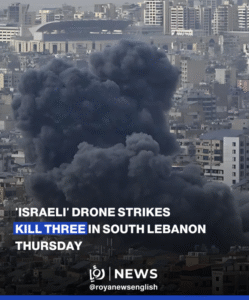Three people were killed in Israeli drone strikes that targeted southern Lebanon on Thursday, according to local reports and security officials. The strikes reportedly hit the town of Khiam, near the border with Israel, and were said to have targeted a vehicle and a building used by Hezbollah operatives. The identities of the victims have not been publicly confirmed, but sources indicate they may be affiliated with the militant group.
The escalation comes amid ongoing cross-border tensions between Israel and Hezbollah, which have intensified significantly since the outbreak of the Israel-Hamas war in Gaza in October 2023. Southern Lebanon has seen near-daily exchanges of fire, leading to civilian casualties, widespread displacement, and mounting international concern over a possible broader conflict.
Thursday’s strikes were among the deadliest in recent weeks, with eyewitnesses describing large explosions and smoke plumes rising over the targeted areas. Rescue workers were reportedly at the scene shortly after the attacks, with the Lebanese Red Cross assisting in emergency efforts.
The Israeli military has not officially commented on the incident but has previously stated that it will continue targeting Hezbollah positions in response to attacks on Israeli territory. Hezbollah, for its part, has vowed retaliation for any Israeli aggression, warning that further escalation could draw Lebanon deeper into the regional conflict.
Residents in southern Lebanon expressed fear over the growing violence, with many families fleeing border towns for safer areas. International mediators have called for restraint, urging both sides to de-escalate before the situation spirals out of control.
The drone strikes also follow a series of Israeli air and artillery attacks across various locations in southern Lebanon over the past month. Hezbollah has responded with rocket and missile launches into northern Israel, causing casualties and property damage on both sides.
As the conflict persists, the United Nations and several governments have reiterated appeals for diplomatic resolution, emphasizing the importance of avoiding a full-scale war between Israel and Hezbollah—two longtime adversaries with a history of deadly confrontations, most notably the 2006 Lebanon War.
On Thursday, Lebanon’s caretaker Prime Minister Najib Mikati condemned the Israeli strikes as a violation of Lebanon’s sovereignty and urged the international community to intervene to prevent further aggression. He also highlighted the humanitarian toll the conflict is taking on civilians in the south.
Analysts warn that the continued tit-for-tat strikes between Israel and Hezbollah risk igniting a broader regional conflict, especially as tensions remain high across multiple fronts in the Middle East. With negotiations between the sides currently stalled, prospects for an immediate ceasefire remain uncertain.


